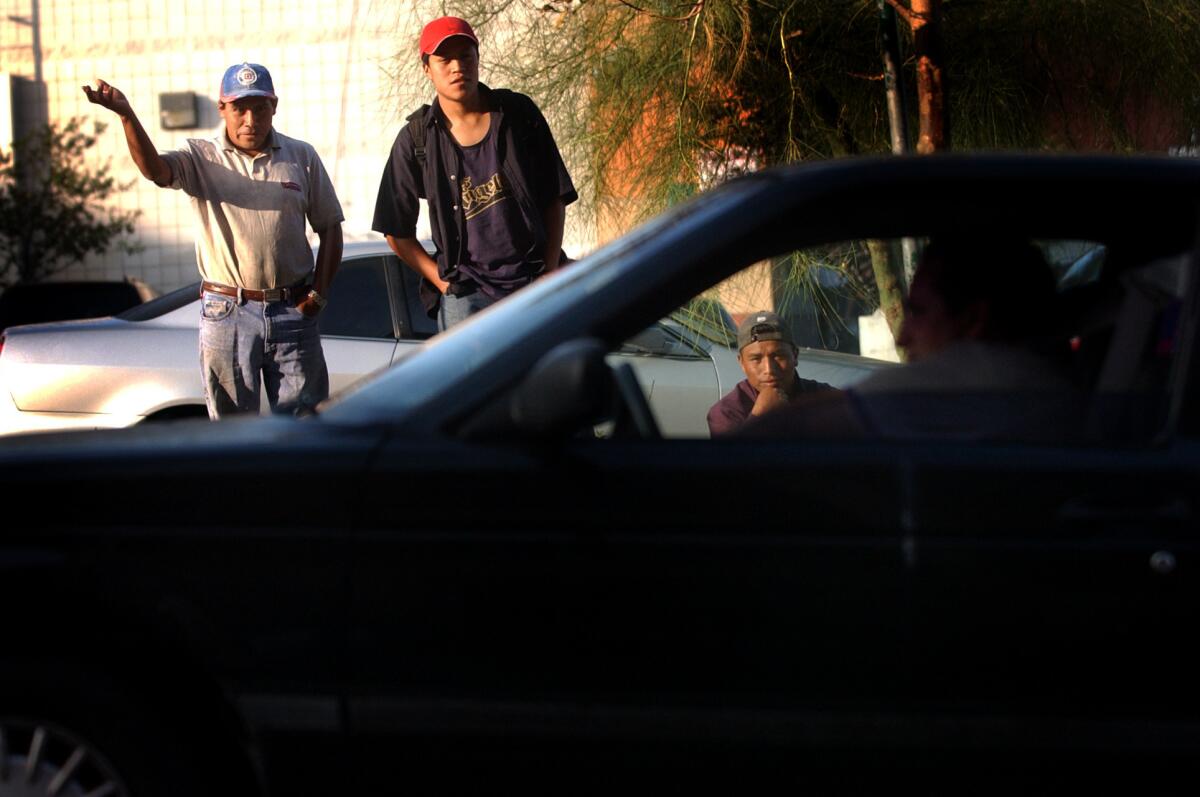Court lifts a ban on day laborers in New York town, but the fight isn’t over

In file photograph, day laborers seek work in Los Angeles. Several ordinances passed by cities to restrict the ability of day laborers to solicit work have been declared unconstitutional by courts, including one this week in New York.
- Share via
Though a New York federal judge struck down a Long Island town’s ban on day laborers soliciting work on public sidewalks, advocates say day laborers are still vulnerable to exploitation and that local governments are trying to find new ways to restrict their ability to find work.
Municipal ordinances to ban day laborers, most beginning in the mid-2000s, have not fared well in court cases across the country.
“We very much won that fight,” said Pablo Alvarado, executive director of the National Day Laborer Organizing Network. “I haven’t seen a city that has enacted an ordinance banning day laborers that had that ordinance stay in place.”
In the most recent case, U.S. District Court Judge Denis Hurley said in a ruling Thursday that the town of Oyster Bay’s ban on day laborers was unconstitutional and violated the workers’ 1st Amendment rights. He said the measure also had an unintended consequence, applying to school bake sales or adults looking to trade work for food.
The ordinance “reaches children selling lemonade at the end of a neighbor’s driveway,” Hurley wrote, “the veteran holding a sign on a sidewalk stating ‘will work for food,’ and students standing on the side of a road advertising a school car wash.”
But although organizers of day laborers celebrated the victory, they say outright bans of those looking for work are a small tool in a larger arsenal of practices cities use to limit or force out day laborers.
Day laborers are mostly immigrants in the country illegally, according to a Pew Research Center report from nearly a decade ago — the last time the issue was at the political forefront. More recent data were not available.
Being dependent on daily income and susceptible to deportation leaves them doubly vulnerable to employers seeking manual labor, day labor advocates say.
Efforts to close day laborer centers and stop workers from looking for jobs on sidewalks were part of a fight mainly waged in the mid-2000s when cities, including some in California, attempted to make congregation on the sidewalk illegal and conducted sting operations to break up clusters of day laborers. Such measures, like Oyster Bay’s, were dismissed by federal judges as illegal.
The Oyster Bay case echoed a lengthy court battle over a similar ordinance in Redondo Beach. The U.S. 9th Circuit Court of Appeals, sounding much like Judge Hurley, ruled in 2011 that the measure impinged on free speech and was so broad that it could be applied to “children selling lemonade on the sidewalk in front of their home, as well as to Girl Scouts selling cookies on the sidewalk.” The U.S. Supreme Court rejected the city’s appeal in 2012.
But now, Alvarado said, police in various jurisdictions are using alternative measures to try to stop day laborers.
“So now it’s not, ‘Show me your papers, please,’” Alvarado said. “It could be, ‘Where are you from, sir?’ or ‘Where are your parents from?’ or ‘Are you a citizen of Mexico?’”
Alvarado said other cities and states have taken the lead from Arizona, which passed a restrictive immigration law, SB 1070, that directs police officers to determine the immigration status of a person they question if they suspect the person is in the country illegally.
(Other provisions of the law were struck down as unconstitutional by the U.S. Supreme Court. Coincidentally, the law also prohibited people from blocking traffic when seeking day labor work. One day after the Oyster Bay ruling, a federal judge in Arizona barred that provision from being enforced.)
Since the passage of SB 1070, Alvarado said he hears regularly from day laborers in other states who have been questioned about their immigration status.
Some cities have tried to find a middle ground. In El Paso, El Centro de los Trabajadores, or “workers’ center,” serves farmworkers who cross the border daily.
Laborers leave Mexico as early as 2 a.m. to arrive at the center, which allows them to shower and sleep and offers English and art classes to day laborers and low-income El Paso residents.
For Oyster Bay, the decision was a setback.
John Venditto, Oyster Bay town supervisor, said in a statement that he was disappointed by the judge’s ruling. He has said the law was intended to address safety concerns because day laborers were congregating in various communities, creating traffic hazards.
“We appreciate that the court recognizes the seriousness of the day laborer problem,” Venditto said, adding the town is reviewing the ruling before deciding whether to appeal.
The 165-square-mile town, with a population of nearly 300,000, is actually a confederation of 18 villages and 18 hamlets.
Known as the home of President Theodore Roosevelt, Oyster Bay has become more famous locally for unwanted publicity: the indictment of the commissioner of planning and development, who was accused in March of tax evasion after collecting $2 million in consulting fees from a paving company.
Twitter: @nigelduara
NEWSLETTER: Get the day’s top headlines from Times Editor Davan Maharaj >>
More to Read
Sign up for Essential California
The most important California stories and recommendations in your inbox every morning.
You may occasionally receive promotional content from the Los Angeles Times.











